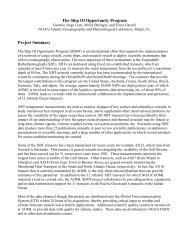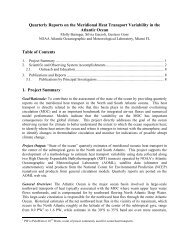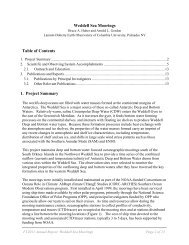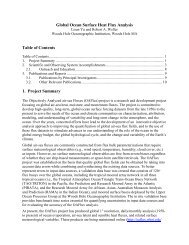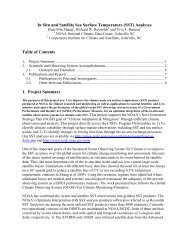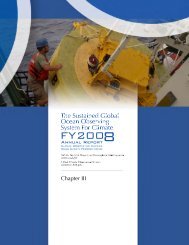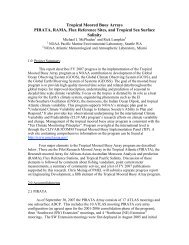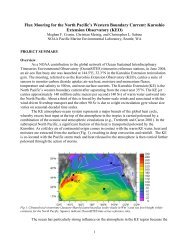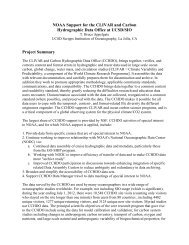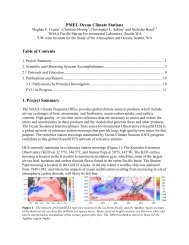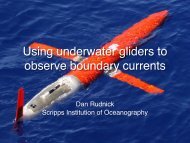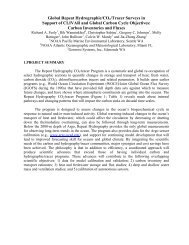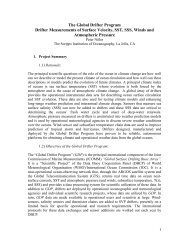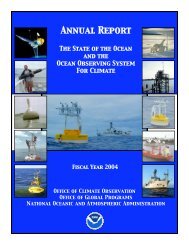GCOS Implementation Plan - WMO
GCOS Implementation Plan - WMO
GCOS Implementation Plan - WMO
Create successful ePaper yourself
Turn your PDF publications into a flip-book with our unique Google optimized e-Paper software.
<strong>Implementation</strong> <strong>Plan</strong> for the Global Observing System for Climate in Support of the UNFCCC<br />
(2010 Update)<br />
Within the framework of the WIS, <strong>WMO</strong> is working towards the adoption of metadata standards and<br />
the extension of the current GTS by introducing new internet-based technology. Any actions taken for<br />
ocean data management will inevitably be linked to, or included within, these activities of <strong>WMO</strong>.<br />
Three data management functions within the oceanic domain are particularly important: Firstly, the<br />
ability to efficiently and effectively communicate data (and metadata) from platforms that are often<br />
remotely located and/or autonomous. While most products required by <strong>GCOS</strong> do not demand realtime<br />
acquisition, experience has shown that a policy of immediate acquisition is the most effective for<br />
assuring that data are available, exchanged and submitted in at least preliminary form to International<br />
Data Centres.<br />
Telecommunication from platforms such as moorings, drifters and floats is limited, and in some cases<br />
this means measurements are lost. Various groups currently do provide data telecommunication<br />
services to the ocean community (e.g., Argos), and these services will continue to be a critical<br />
contribution. However, to implement the networks and systems being proposed, the community<br />
requires at least an order of magnitude increase in telecommunications capacity and, for some<br />
systems, an increase of 100 times is necessary.<br />
Secondly, there is the function of data transport between the various components of the networks.<br />
The ocean community has, to date, made extensive use of the <strong>WMO</strong> WIS for exchange of data in real<br />
time and near-real time. Other datasets, particularly from hydrographic cruises, are exchanged via<br />
other means. Wherever practical, ocean data should be exchanged freely in real time. This policy has<br />
been followed with Argo and, increasingly, in other endeavours contributing to the oceanic climate<br />
observing system. The definitions adopted by OOPC and JCOMM for “operational” status in effect<br />
demand such arrangements. Recently, increasing use has been made of internet systems to<br />
exchange data and, in particular, using the Open Source Data Access Protocol (OPeNDAP) protocol.<br />
Yet other systems are being considered by <strong>WMO</strong> within the WIS.<br />
Thirdly, the function of data assembly and quality control are critical for ensuring that the global ocean<br />
data meet the climate-quality standards and are accessible to users. The Tropical Atmosphere-Ocean<br />
Array (TAO) and initiatives such as those of the Global Temperature-Salinity Profile Project have<br />
ushered in an era of greatly improved access to data, greater reliability of delivery and access and<br />
improved quality, and have facilitated and made more efficient data assembly procedures. In concert<br />
with the Data Assembly Centre activities of the World Ocean Circulation Experiment (in part continued<br />
through IODE and CLIVAR), the community is now better able to produce high-quality datasets, in<br />
time-frames that are necessary for some climate issues. Through JCOMM and IODE, these initiatives<br />
continue to provide significant benefit to the ocean community. Other initiatives such as the World<br />
Ocean Database of the US National Oceanographic Data Center, the International Comprehensive<br />
Ocean-Atmosphere Dataset Project, and the Global Oceanographic Data Archaeology and Rescue<br />
(GODAR) project also provide significant capability for developing oceanic climate datasets and<br />
analyses. The World Data Centre for Glaciology and the National Snow and Ice Data Center (NSIDC),<br />
among others, provide similar functionality for certain sea-ice data.<br />
The following Actions will be undertaken to develop and implement the data management component<br />
of the oceanic domain of <strong>GCOS</strong>:<br />
The IOC should monitor the implementation of the IOC Data Policy.<br />
Action O31 [IP-04 O32]<br />
Action: Monitoring the implementation of the IOC Data Policy.<br />
Who: JCOMM.<br />
Time-Frame: Continuous.<br />
Performance Indicator: Reports by JCOMM and IODE to the IOC.<br />
Annual Cost Implications: 1-10M US$ (10% in non-Annex-I Parties).<br />
The IODE and JCOMM are cooperating on the integration of ocean data management through<br />
harmonization and promulgation of standards, interoperability between the various ocean data<br />
systems to increase accessibility (including the IODE Ocean Data Portal and the WIS), the collection<br />
of appropriate metadata and setting guidelines for capacity-building and training. This cooperation is<br />
being conducted as a pilot project of the <strong>WMO</strong> WIGOS and includes ocean data assembly, quality<br />
and orderly archiving of ocean datasets and products.<br />
99



